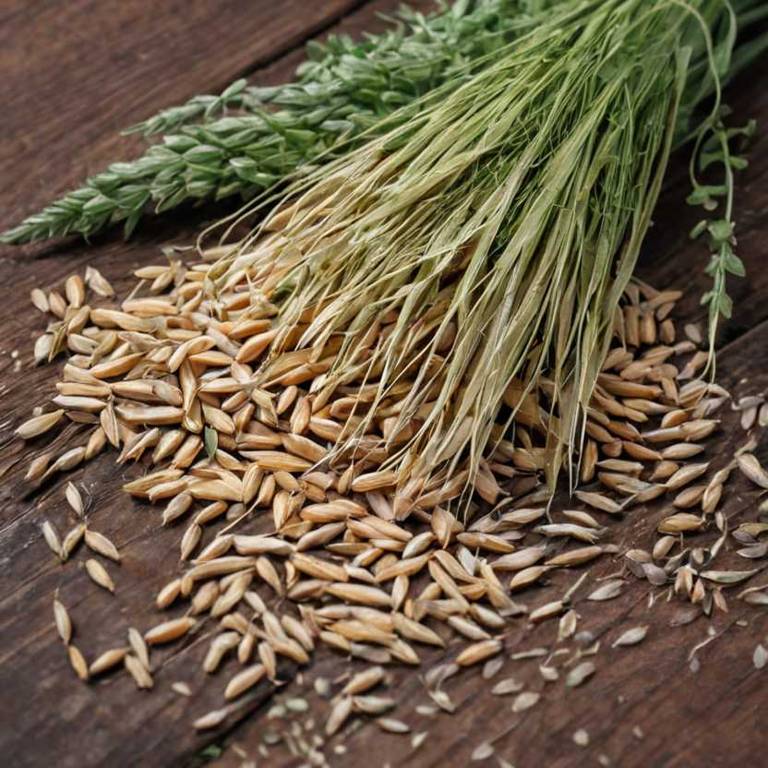Wheat (Triticum aestivum)
Wheat (Triticum aestivum) is a member of the Poaceae family, native to Europe, Middle East, and Central Asia. Traditionally, its seeds, leaves, and stems have been used for culinary uses, decoctions, and infusions.
This herb is particularly valued for its tonic, diuretic, and anti-inflammatory actions, and has a long history of use in european herbal medicine, mediterranean herbal traditions, and traditional chinese medicine.

Quick Facts / Key Information
| Common Name | Wheat |
|---|---|
| Scientific Name | Triticum aestivum |
| Plant Family | Poaceae |
| Genus | Triticum |
| Species | aestivum |
| Native Range | Europe, Middle East, Central Asia |
| Plant Parts Used | Seeds, Leaves, Stems |
| Primary Medicinal Actions | Tonic, Diuretic, Anti-Inflammatory |
| Primary Traditional Systems | European Herbal Medicine, Mediterranean Herbal Traditions, Traditional Chinese Medicine |
| Historical Preparation Methods | Culinary Use, Decoction, Infusion |
Botanical Identity
- Scientific Name
- Triticum aestivum
- Common Name
- Wheat
- Synonyms / Alternative Names
- Common Wheat, Triticum Wheat, Wheat
- Plant Family
- Poaceae
- Genus
- Triticum
Botanical Description
- Growth Habit
- Annual herbaceous plant.
- Height
- It typically grows to a height of 100 to 150 centimeters.
- Leaves
- Broad leaves with upper surface green and lower surface gray-green, featuring prominent stomatal bands along the midrib.
- Flowers
- Inflorescence composed of spikelets arranged in a panicle, each spikelet bearing two lemmas and one palea, with florets having three stamens and a single pistil, flowers predominantly green with some lemma tips displaying a purplish hue, actinomorphic symmetry.
- Stems
- Cylindrical, hollow, ribbed, and cylindrical in cross-section, the stems are typically erect, with a branching pattern of nodes and internodes, and have a surface that is usually glabrous or slightly pubescent depending on the variety.
Traditional Uses / Historical Use
Traditional Systems
- European Herbal Medicine
- Mediterranean Herbal Traditions
- Traditional Chinese Medicine
- Japanese Kampo Medicine
Historical Preparation Methods
- Culinary Use
- Decoction
- Infusion
- Powder
Medicinal Actions
- Tonic
- In herbal texts, considered a soothing tonic, for broad-use formulations.
- Diuretic
- As described in traditional systems, a gentle diuretic, in urinary system discussions.
- Anti-inflammatory
- Historically regarded as a warming anti-inflammatory, for irritation-related applications.
- Stimulant
- Traditionally described as a calming stimulant, for vitality-related discussions.
Active Compounds
- Flavonoid
- A widely occurring class of plant polyphenols found in leaves, flowers, and fruits.
- Phenolic Acid
- Naturally occurring phenolic compounds present in many plant species.
- Tannin
- Naturally occurring polyphenols widely distributed in woody and leafy plant parts.
- Glycoside
- Naturally occurring metabolites distributed across many plant species.
Modern Research Overview
This section is reserved for future summaries of scientific research related to this plant. As additional verified sources are reviewed, relevant study information will be added here.
Safety & Contraindications
- General Precautions
- Precautionary considerations have been reported in relation to this herb.
- Contraindications
- Available information does not clearly establish contraindications for the use of this herb.
- Allergies
- Allergic reactions have been reported, particularly in individuals sensitive to related plant families.
- Drug Interactions
- Interactions with prescription medications have not been well documented.
- Toxicity
- Toxic effects associated with this herb have not been well documented.
- Pregnancy & Breastfeeding
- Use during pregnancy or breastfeeding has not been clearly established in available sources.
Preparation & Usage Methods
- Infusion
- Infusions are commonly prepared using hot water to release aromatic and soluble components.
- Decoction
- A preparation method involving prolonged boiling of roots, bark, or dense plant material.
- Poultice
- Fresh or dried plant material is applied externally to the skin.
- Culinary Use
- Culinary use includes adding plant material to recipes or beverages.
- Powder
- Plant parts are dried and mechanically reduced to a powdered form.
Growing, Harvesting & Storage
Growing / Cultivation
- Soil
- Prefers loamy soil with well-drained conditions. Typically grows best in nutrient-rich soils.
- Sunlight
- Thrives in full sun. Tolerates full sun to partial shade.
- Watering
- Prefers well-balanced moisture levels. Tolerates periodic dry conditions.
Medical Disclaimer
The information provided on this page is for educational and informational purposes only. It is not intended to diagnose, treat, cure, or prevent any medical condition. Always consult a qualified healthcare professional before using any herb for medicinal purposes.